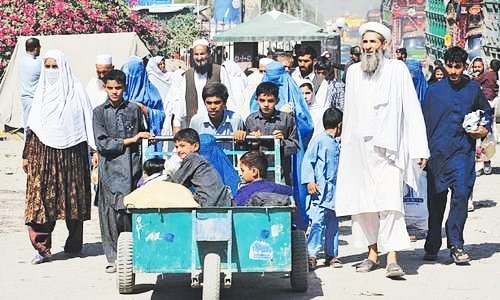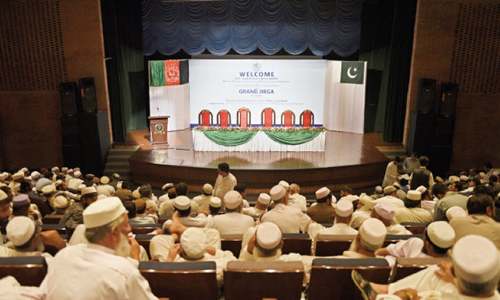
Just how many Afghans — registered and undocumented — are there in Pakistan?
While there were 1.7 million registered Afghan refugees in Pakistan, according to a 2005 count, the actual number of undocumented Afghans residing in this country has been open to conjecture. Officially, we are told there are 1m here.
But according to the Fata Analysis and Strategy Team (Fast), an intelligence and information collation and analysis wing under the Fata Secretariat Law & Order Department, between 2010 and mid-August, 2016, 16.49m undocumented Afghans entered Pakistan via Torkham border crossing alone — that is 51.6pc of Afghanistan’s current approximate 32m population.
Read: Leaving Pakistan, 'our second home'
What is more surprising, however, is that 20.28m undocumented Afghans went back to Afghanistan during the same period, indicating a disturbing trend of an unchecked and unregulated flow of human traffic on both sides of the border.
But while the authorities have had no clue about the identity, purpose, nature and number of their frequent two-way sojourns, the data does seem to suggest that economic opportunities and other needs, rather than security, were the main motivation for the Afghans’ stay in Pakistan.
Situation may change once all the new posts become operational
“Clumped together, the data would surpass Afghanistan’s existing population,” a senior government official in Fata said. “But what we see here is a different phenomenon. The undocumented Afghans frequently travelled between Pakistan and Afghanistan,” the official said, suggesting that in numerous cases the same Afghan nationals may have come and gone back multiple times.
“There can be two reasons for this: either they have familial stakes in both countries, or they have economic stakes. The fact that they frequently visited their country indicates they were not deterred by the security environment there,” the official said, requesting not to be named.
“This is a security nightmare,” another senior government official said. “If this is the figure for just one border crossing, who knows how many entered Pakistan from the other border crossings?” the official asked, also requesting anonymity.
Pakistan has eight formal border crossings with Afghanistan, of which Torkham is one. The other seven are: Arandu (Chitral), Gursal (Bajaur), Nawa Pass (Mohmand), Kharlachi (Kurram), Ghulam Khan (North Waziristan), Angoor Adda (South Waziristan) and Chaman (Balochistan).
The military said on Thursday they would be building 18 proper border crossings with Afghanistan to regulate cross-border movement. Additionally, there are scores of unfrequented routes along the 2,430km border between Pakistan and Afghanistan, used mostly by smugglers.
It was, however, not immediately known if authorities at the other crossings with Afghanistan also maintained similar record of cross-border movement.
Pakistan has recently undertaken to build border gates at all eight crossings as part of the border-management plan, including the construction of a trench on Afghanistan’s border with Balochistan. It has since operationalised one at Torkham after a violent standoff with Kabul in June 2016.
Officials in the Afghan Refugees Commissionerate acknowledge that while the number of registered Afghans living in Pakistan is pretty much documented and accounted for, no one has a clue as to the number of undocumented Afghans in this country. The one million figure being dished out routinely, they say, was a guesstimate at best.
Officials say that they estimate there could be 2m undocumented Afghans in Karachi alone, followed by a million each in Punjab, Khyber Pakhtunkhwa and Balochistan. This would put the number of undocumented Afghans in Pakistan at five million.
The 2005 census for the Afghans, on the basis of which Proof of Registration (PoR) cards were issued to the registered Afghans, does not take into account the number of undocumented Afghans, nor does it take into account their population growth rate.
Aid agencies estimate that the documented Afghans add an average of 65,000 to 70,000 children annually to their existing population. This means that the population of documented refugees has risen by another 700,000 since 2005, officials say, making their total population standing at 2.2m.
The document prepared by Fast gives some astounding figures based on cross-border movement. The document shows that between 2010 and 2016 (mid-August), a total of 908,799 Afghans arrived in Pakistan on valid travel documents. As against this, a total of 1,205,871 Afghans travelled back to their country.
Unregulated flow
It is, however, the inflow and outflow of undocumented Afghans that has been a source of major concern for government and security agencies.
The inflow and outflow of undocumented Afghans to and from Pakistan at Torkham never dropped below the one million mark. Starting from 2010, when a total of 1.7m undocumented Afghans poured into Pakistan via Torkham, 2.1m went back.
This figure, however, sharply rose in 2011 and 2012, when the number of undocumented Afghans dramatically shot up to 3.57 and 3.58m respectively. An equal number of these undocumented Afghans went back to their country during the same corresponding period.
The number of incoming undocumented Afghans, however, came down to 2.3m and 2m in 2013, 2014, and 2015 respectively, with the number of outgoing undocumented Afghans suggested an upward trend in 2013 with 3.6m returning home.
The figure of undocumented returning Afghans, however, registered a steady decline from 2014, from 2.6m to 2.5m in 2015 and to 1.5m by mid-August, 2016. The total number of undocumented Afghans having crossed back to their homeland via Torkham in the last six-and-a-half years, thus, comes to 20.28m.
Since the enforcement of border management at Torkham, banning the entry of undocumented Afghans into Pakistan, their number has dropped from 2m and 1.9m in April and May, 2016, respectively, to zero in July and August, documents show.
This contrasts with the number of Afghans travelling to Pakistan with valid documents via Torkham from 13,175 in July to 15,673 by August 22, 2016.
Repatriation concerns
Pakistan granted another six months’ extension in stay for the documented Afghans till Dec 31, 2016 and undocumented persons till Nov 15, 2016. The ministry of states and frontier regions has prepared an action plan to facilitate what it calls voluntary repatriation of Afghans to their homeland.
A donor conference on Afghanistan due on Oct 5, 2016 in Brussels, jointly hosted by the EU and Kabul, bringing together up to 70 countries and 30 international organisations and agencies, will, among other things, discuss the rehabilitation of returning refugees.
So far, as part of the repatriation plan, 140,000 undocumented Afghans and 89,000 documented Afghan refugees have returned home. Officials are optimistic that by Dec 31, 2016, they would have surpassed the target of repatriating 200,000 Afghan refugees.
Part of the National Action Plan, the repatriation of Afghan refugees and undocumented Afghans may take more time than envisaged, officials say, partly due to concerns that forced repatriation or alleged harassment of the Afghans in Pakistan may further strain the already strained relations between Kabul and Islamabad, and partly due to non-availability or non-provision of required funding to speed up the process.
With Islamabad blowing hot and cold on the issue, there already is talk in official circles in Islamabad of granting yet another extension to the Afghan refugees beyond the Dec 31, 2016, deadline till Dec 2017 to repatriate them with honour and dignity.
Some officials, however, acknowledge that while it was never realistically possible to repatriate all Afghans — documented and undocumented — during the current extension expiring this December, the government should have at least done its homework before announcing the deadline. “The cut-off date was announced without much homework. Everything is being done as a belated afterthought,” an official deplored.
Published in Dawn, September 2nd, 2016














































